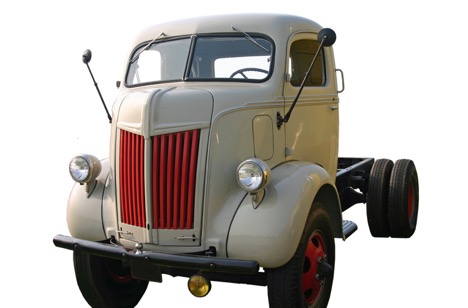History of the Truck

Where would we be in the trucking industry without the evolution of the truck? Allowing for the advancement of the shipping of goods far and above the government’s ability to interject, shipments via public and private roads will continue to be among the cheapest, fastest, and pragmatic means of distribution. Let’s take a quick look at the history of the vehicle that has become the very center of this materialistically driven world.
Gottlieb Daimler creates “vehicle No. 42” in 1896
This “truck” was supposedly capable of towing up to 3,300 pounds with a 4-horsepower, 2-cylinder motor. Whether it was actually able to do this is another question for another time; nonetheless, this is easily the start of the motorized truck. About 10 years later, Daimler would introduce a 10-horsepower truck marketed toward farmers boasting a 7 mph top speed.
1899 Alexander Winton of the Winton Motor Carriage Company invents first 18 wheeler
Winton developed this vehicle to help transport cars his company was building and selling to consumers across the country.
1900 Mack is founded in Brooklyn, NY
Mack is the first company to use an automatic starter, making the hand crank obsolete. Mack became a popular name brand in the 1920s and developed a reputation as a tough and dependable vehicle.
1914 the first “semi-trailer” was invented
Used to haul a boat behind Fords, August Fruehauf built trailers that immediately became popular and widely used to transport freight across the U.S. Fruehauf Trailers are still in business today and are one of the largest sellers of trailers in the U.S.
1918 Chevrolet produces its first production line pickup-truck
Built off of their passenger car frame, this vehicle did not have a rear-end, meaning buyers had to install their own. Chevrolet would not offer a completely assembled truck until 1931.
1925 Ford produces their Model-T Runabout with Pickup Body
Ford added the option for a bed to their Model-Ts with this production and would go a step further in 1928 with the Model A. The Model A would offer a steel-cab and roll up windows making it a luxury ride.
1925 the Dodge brothers create a three-quarter ton
With the help of Chrysler, this became a half ton vehicle in 1929.
1939 Peterbilt forms out of Tacoma, WA
Invented and designed to help haul logs, Peterbilt trucks effectively ended log drives (the use of rivers as the main way of transporting timber).
Over the last eight decades, the advancement of technology has allowed us to haul more weight on these vehicles and haul it farther and faster. Manufacturers have come and gone but the history and those who made the industry what it is today still remain.
Today, we have alternative fuel sources, and with the help of Toyota, Nikola, Tesla and several others, hydrogen fuel cells will begin to power our tractor-trailer combinations. In the works is an electric/battery powered vehicle but given the constraints of battery technology, who knows how long it will take to perfect this power source.
The government has hindered the growth and advancement of efficiency with concerns about how this affects our world from a health and emissions standpoint. How will new technology be regulated? How will the industry adapt to ensure the masses get what they need? Only time will tell. One thing is for certain: the industry will live on and the drivers and carriers will continue to adapt. They are our unsung heroes.
Today’s job market is hot. Here’s why becoming a truck driver or owner-operator might be the perfect career choice for you.
Topics:

Find out how our platform gives you the visibility you need to get more done.
Get helpful content delivered to your inbox.
Schedule a demo.
Find out how our platform gives you the visibility you need to get more done.





